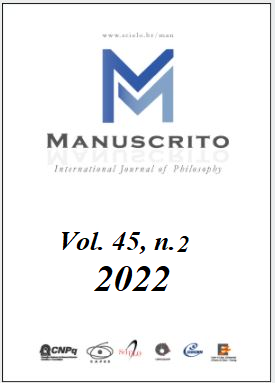Resumo
Ascribing moral and legal responsibility for negligent actions and omissions has always been deeply contested because it seems to be in tension with the natural intuition that responsibility requires control. In this paper I show that we can accommodate culpability for negligence within a control-based account of responsibility if we adopt a “capacitarian” view of control, according to which agents have responsibility-relevant control whenever they have the requisite abilities and opportunity to bring about the morally desired outcome. After explaining the structure of negligent wrongdoing and motivating this conception of control, I show how it can be successfully employed to account for the culpability of negligent agents and to rebut several important arguments against the idea that negligence can be culpable in the first place. I also explain in what respects my proposal is superior to other capacitarian views found in the literature.
Referências
Alexander, Lawrence, Kimberly Ferzan, and Stephen Morse. 2009. Crime and Culpability: A Theory of Criminal Law, Cambridge: Cambridge University Press.
Amaya, Santiago. 2022. “Negligence: Its Moral Significance”, in J. Doris and M. Vargas (Eds.), Oxford Handbook of Moral Psychology, Oxford: Oxford University Press.
Brink, David and Dana Nelkin. 2013. “Fairness and the Architecture of Responsibility”, Oxford Studies in Agency and Responsibility, Vol. 1. Oxford: Oxford University Press , pp. 284-314.
Clarke, Randolph. 2014. Omissions: Agency, Metaphysics, and Responsibility. Oxford: Oxford University Press .
Clarke, Randolph. 2017a. “Ignorance, Revision, and Commonsense,” in Philip Robichaud and Jan Willem Wieland (Eds.), 2017, Responsibility: the Epistemic Condition, pp. 233-251. Oxford: Oxford University Press.
Clarke, Randolph. 2017b. “Blameworthiness and Unwitting Omissions,” in Dana Nelkin and Samuel Rickless (Eds.) The Ethics and Law of Omissions, pp. 63-83. Oxford: Oxford University Press.
Hart, Herbert. 1968. Punishment and Responsibility. Oxford: Oxford University Press .
Howarth, David. 2006. “Many Duties of Care: Or a Duty of Care? Notes from the Underground,” Oxford Journal of Legal Studies 26: 449-472.
Husak, Douglas. 2011. “Negligence, Belief, Blame, and Criminal Liability: The Special Case of Forgetting,” Criminal Law and Philosophy 5: 199-218.
King, Matt. 2009. “The Problem with Negligence,” Social Theory and Practice 35: 577-595.
Levy, Neil. 2011. Hard Luck. Oxford: Oxford University Press .
McBride, Nicholas. 2004. “Duties of Care: Do They Really Exist?” Oxford Journal of Legal Studies 24: 417-41.
McGeer, Victoria and Phillip Pettit. 2015. “The Hard Problem of Responsibility,” in Oxford Studies in Agency and Responsibility, Vol. 3, pp. 160-188. Oxford: Oxford University Press .
Moore, Michael S. and Heidi Hurd. 2011. “Punishing the Awkward, the Stupid, the Weak, and the Selfish: The Culpability of Negligence,” Criminal Law and Philosophy 5: 147-198.
Murray, Samuel. 2017. “Responsibility and Vigilance”, Philosophical Studies, 174 (2): 507-27.
Murray, Samuel, and Manuel Vargas. 2020. “Vigilance and Control”, Philosophical Studies 177: 825-843.
Nelkin, Dana. 2016. “Difficulty and Degrees of Moral Praiseworthiness and Blameworthiness”. Nous, 50 (2): 356-378.
Nelkin, Dana andSamuel Rickless . 2017. “Moral Responsibility for Unwitting Omissions: A New Tracing View”, in Dana Nelkin and Samuel Rickless (Eds.) The Ethics and Law of Omissions , pp. 106-30. Oxford: Oxford University Press .
Nottelmann, Nikolaj. 2007. Blameworthy Belief: A Study in Epistemic Deontologism. Dordrecht: Springer.
Raz, Joseph. 2011. “Responsibility and the Negligence Standard.” In Raz, From Normativity to Responsibility, pp. 255-269. Oxford: Oxford University Press .
Rosen, Gideon. 2004. “Skepticism about Moral Responsibility.” Philosophical Perspectives 18: 295-313.
Rudy-Hiller, Fernando. 2017. “A Capacitarian Account of Culpable Ignorance”, Pacific Philosophical Quarterly 98 (S1): 398-426.
Rudy-Hiller, Fernando. 2020. “Reasonable expectations, moral responsibility, and empirical data”, Philosophical Studies 177(10): 2945-2968.
Scanlon, Thomas. 1998. What We Owe to Each Other. Cambridge MA: Harvard University Press.
Smith, Angela. 2005. “Responsibility for Attitudes: Activity and Passivity in Mental Life,” Ethics 115 (2): 236-271.
Stark, Findlay. 2016. Culpable Carelessness: Recklessness and Negligence in the Criminal Law, Cambridge: Cambridge University Press .
Sverdlik, Steven. 1993. “Pure Negligence.” American Philosophical Quarterly 30: 137-49.
Talbert, Matthew. 2017. “Omission and Attribution Error”, in D. Nelkin and S. Rickless (Eds.) The Ethics and Law of Omissions , Oxford: Oxford University Press , 17-35.
Vargas, Manuel. 2013. Building Better Beings: A Theory of Moral Responsibility. New York: Oxford University Press.
Vargas, Manuel. 2020. “Negligence and Social Self-Governance,” in Alfred Mele (Ed.), Surrounding Self-Control. Oxford: Oxford University Press.
Wolf. Susan. 1990. Freedom within Reason. Oxford: Oxford University Press .
Zimmerman, Michael. 1986. “Negligence and Moral Responsibility.” Noûs 20: 199-218.
Zimmerman, Michael. 1997. “Moral Responsibility and Ignorance.” Ethics 107: 410-26.

Este trabalho está licenciado sob uma licença Creative Commons Attribution 4.0 International License.
Copyright (c) 2022 Manuscrito: Revista Internacional de Filosofia


